#Experiment in Revolution 2020
Text
honestly tho i hadnt connected varien to the reason why i have ‘industrial’ as one of my spotify likes genres but like. it makes sense now lol
#speculation nation#shes experimented with a lot of stuff. not all industrial#but one of my fav albums is literally 'the second industrial revolution'. it's... literally in the name...#im remembering how much i love her music tho. i was listening OBSESSIVELY for like all of 2020#sometimes there r albums that just dont sound right if u dont listen to the whole thing in a row#or rather. not that they sound Wrong. but it's just so much better when you listen to the whole thing#a story in an album.#i have a few of them aside from varien's stuff but like ALL of her stuff. i HAVE to listen in order#'death asked a question' is 15 mins of the best sounds for my ears#'the second industrial revolution' is a fucking JOURNEY & was heavily associated with the creation of kallias and fang both#oh god im so in love with her music. this is all i need to listen to right now
0 notes
Text
"When Francois Beyers first pitched the concept of 3D ocean farming to the Welsh regulators, he had to sketch it on napkins.
Today the seafood farm is much more than a drawing, but if you walked along the Welsh coastal path near St David’s, all you’d see is a line of buoys. As Beyers puts it: “It’s what’s below that’s important.”
Thick tussles of lustrous seaweed suspend from the buoys, mussels cling to its furry connective ropes and dangling Chinese lantern-esque nets are filled with oysters and scallops.
“It’s like an underwater garden,” says Beyers, co-founder of the community-owned regenerative ocean farm, Câr-y-Môr. The 3-hectare site is part of a fledgling sector, one of 12 farms in the UK, which key players believe could boost ocean biodiversity, produce sustainable agricultural fertiliser and provide year-round employment in areas that have traditionally been dependent on tourism.
Created in 2020 by Beyers and six family members, including his father-in-law – an ex-shellfish farmer – the motivation is apparent in the name, which is Welsh for “for the love of the sea”. ...

Pictured: Drone shot of Câr-y-Môr, which is on the site of abandoned mussel farms. Image: Scott Chalmers
Ocean farming comes from the technical term ‘integrated multi-trophic aquaculture’, which means a mixture of different seaweed and shellfish species growing together to mutually benefit each other. But it’s not just a way of growing food with little human input, it also creates ocean habitat.
“You’re creating a breeding ground for marine animals,” explains Beyers who adds that the site has seen more gannets diving, porpoises and seals – to name a few – since before the farm was established.
Ocean farms like Câr-y-Môr, notes Ross Brown – environmental research fellow at the University of Exeter – have substantial conservation benefits.
“Setting up a seaweed farm creates an exclusion zone so fishermen can’t trawl it,” explains Brown, who has been conducting experiments on the impacts of seaweed and shellfish farms across the UK.
Brown believes a thriving ocean farming industry could provide solutions to the UK’s fish stock, which is in “a deeply troubling state” according to a report that found half of the key populations to be overfished. “It would create stepping stones where we have safe havens for fish and other organisms,” he adds.
But UK regulators have adopted a cautious approach, note Brown and Beyers, making it difficult for businesses like Câr-y-Môr to obtain licenses. “It’s been a tough old slog,” says Beyers, whose aim is to change the legislation to make it easier for others to start ocean farms.
Despite navigating uncharted territories, the business now has 14 full-time employees, and 300 community members, of which nearly 100 have invested in the community-benefit society. For member and funding manager Tracey Gilbert-Falconer, the model brings expertise but most importantly, buy-in from the tight-knit local community.
“You need to work with the community than forcing yourself in,” she observes.
And Câr-y-Môr is poised to double its workforce in 2024 thanks to a Defra grant of £1.1 million to promote and develop the Welsh seafood industry as part of the UK Seafood Fund Infrastructure Scheme. This will go towards building a processing hub, set to be operational in April, to produce agricultural fertiliser from seaweed.
Full of mineral nutrients and phosphorous from the ocean, seaweed use in farming is nothing new, as Gilbert-Falconer notes: “Farmers in Pembrokeshire talk about their grandad going down to the sea and throwing [seaweed] on their farms.”
But as the war in Ukraine has caused the price of chemical fertiliser to soar, and the sector tries to reduce its environmental impact – of which synthetic fertiliser contributes 5% of total UK emissions – farmers and government are increasingly looking to seaweed.
The new hub will have capacity to make 65,000 litres of sustainable fertiliser annually with the potential to cover 13,000 acres of farmland.
But to feed the processing hub, generate profit and reduce their dependency on grants, the co-op needs to increase the ocean farm size from three to 13 hectares. If they obtain licences, Beyers says they should break even in 18 months.
For now, Beyers reflects on a “humbling” three years but revels in the potential uses of seaweed, from construction material to clothing.
“I haven’t seen the limit yet,” he smiles."
-via Positive.News, February 19, 2024
#wales#welsh#ocean#marine biology#aquaculture#marine life#marine animals#seaweed#sea scallops#oysters#united kingdom#uk#conservation#conservation news#overfishing#environmental news#farming#sustainable agriculture#sustainability#ocean farming#good news#hope
454 notes
·
View notes
Text
Didn't wanna clog up your post, and these sources are more about relationships of time with space/place, but here's some stuff that I've encountered:
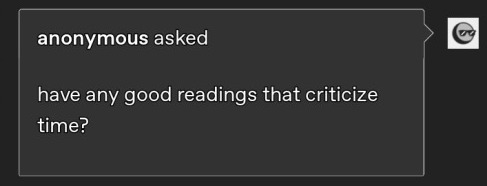
---
“Temporal sovereignty”. Contemporary US/Australian claims over time-keeping. Reclaiming agency by operating on Indigenous/alternative time schedules. The importance of the “time revolution” in the Victorian era to Euro-American understandings of geology and deep past, precipitating nineteenth-century conquest of time. Mid-twentieth century understanding of “deep time” and its co-option by the Australian state. "Deep time dreaming".
Laura Rademaker. “60,000 Years is not forever: ‘time revolutions’ and Indigenous pasts.” Postcolonial Studies. September 2021.
---
How "time is a form of enclosure". Checkpoints, "baroque processes to apply for permits to travel", fences, incapacity to change residences, and other "debilitating infrastructures" work to "turn able bodies into a range of disabled bodies" by "stretching time". This is a "slow death" and a simultaneous "slowing down of life" because "it takes so long to get anywhere" and "movement is suffocated". Thus "time itself is held hostage". This "suspended state" of anxiety and endless wait-times "wreaks multigenerational psychological and physical havoc". "Checkpoints ensure one is never sure of reaching work on time. Fear of not getting to work then adds to the labor of getting to work [...]. Bodies in line at checkpoints [...] [experience] the fractalizing of the emotive, cognitive, physiological capacities" through a "constant state of uncertainty". "The cordoning of time through space contributes to an overall 'lack of jurisdiction over the functions of one's own senses' [...] endemic to the operation of colonial rule". This "extraction of time" produces a "depleted" and tired person "beholden to the logistics" of administrative apparatuses, community suffers and "communing is thrawted".
Jabir K. Puar. "Spatial debilities: Slow Life and Carceral Capitalism [...]." South Atlantic Quarterly 120. April 2021.
---
The "apocalyptic temporality" that presumes extinction. Indigenous Polynesian/Pacific perceptions and ways of being "destabilize the colonial present" and also "transfigure the past" by "contesting linear and teleological Western time". Indigenous "ontologies of cyclical temporality or inhabitation of heterogenous time". How United States and Europe colonized Oceania for weapons testing and conquest of tropical Edens while rendering local Indigenous people "ungrievable" and "without future". "Pacific time is a layering of oral and somatic memory". Instead of accepting an apocalyptic future or doomsday or nightmare, assert the possibility of a livable future, in spite of "Western temporal closures".
Rebecca Oh. “Making Time: Pacific Futures in Kiribati’s Migration with Dignity, Kathy Jetnil-Kijiner’s Iep Jaltok, and Keri Hume’s Stonefish.” MFS Modern Fiction Studies. Winter 2020.
---
Colonial "space-time homogenization". The experience of "homogenous, empty time". Orientalist "time lag" and the naturalization of a supposed East-West hemispheric divide. Late Victorian imperial conceptions of temporality. The British establishment of the Greenwich meridian and International Date Line. The influence of British imperial seafaring and cartography on the establishment of time and on European/US feelings towards the Pacific Ocean. How the origin of English science fiction literature, space travel aspirations, and time travel narratives coincided with the Yellow Peril and xenophobia targeting East Asia.
Timothy J. Yamamura. "Fictions of Science, American Orientalism, and the Alien/Asian of Percival Lowell". Dis-Orienting Planets: Racial Representation of Asia in Science Fiction. 2017.
---
Imprisonment as time-control. Here “the question of the past the present and the future indeed time itself looms” especially around the prisoner. “The law renders punishment in units of time”, taking away a the right to a future. There are alternative worlds, many of them, which have been practiced and brought into being, which colonization tried to obscure. There is “a whole anthropology of people without future embedded in the assumptions that justify mass imprisonment as poverty management”. "The prison’s logic exterminates time as we know it”. In prison, bodies have been alienated from time and history ... the punishment seems endless ... to “achieve a measure of agency and possibility it is necessary to redeem time”, to refuse the doom, fated to a life of abandonment.
Avery Gordon. “Some Thoughts on Haunting and Futurity.” borderlands. 2011.
---
Bursting the Limits of Time: The Reconstruction of Geohistory in the Age of Revolution (Martin J.S. Rudwick, 2010) explores how the advent of European sciences like geology, preceding the "time revolution" when Europeans experienced revelations about the scale of "deep time", happened alongside and after the Haitian Revolution and other abolitionist movements. French, German, and British naturalists translated the explosion of "new" scientific knowledge from the colonies, so that the metropolitan European audience became a market for historical and scientific "narratives" about how "nature" and time functioned.
---
Prartik Chakrabarti's writing on time, temporality, and "the deep past" as British imperial concepts built in conversation with colonial encounters with South Asia. (British Empire reaching such heights in the middle of the nineteenth century at the same time that the newly professionalized sciences of geology were providing revelations about the previously unknown vast scale of "deep time". New colonial anthropology/ethnology also presumed to connect this "primitive" past with "primitive" people.)
See Chakrabarti's "Gondwana and the Politics of Deep Past". Past & Present. 2019.
---
We must witness and consider "multiple space-times" to understand how "unfree labour" of plantations was "foundational" to contemporary work, movement, subjugation, health, etc. We must "trace the geneaology of contemporary sovereign institutions of terror, discipline and segregation" [workplaces, imperial/colonial nations, factories, mines, etc.] back in time to plantations. How "the [plantation] estate hierarchy survives in post-plantation" times and places, with the plantation "being a major blueprint of socialization into [contemporary] work". The plantation was "a laboratory for [...] migration regulation in subsequent epochs" that practiced methods of racializing and criminalizing.
Irene Peano, Marta Macedo, and Colette Le Petitcorps. "Introduction: Viewing Plantations at the Intersection of Political Ecologies and Multiple Space-Times". Global Plantations in the Modern World: Sovereignties, Ecologies, Afterlives. 2023.
---
“Slow life” and the relationship between “settler colonialism, carceral capitalism, and the modulation of ... registers of time,” including “historical time, the stealing of time through the expansion of labor time, ... and the cordoning off of space through time”. For example, as in occupied zones or at border checkpoints, “the cordoning off of space through time” includes physical architecture like fences and customs, obstacles that impede movement and rhythm, so that “nothing ever happens on time” and there is “a stretching of time”. All the wasted time spent in line, showing papers, waiting for confirmation, etc. “is not a by-product of surveillance, it is the point of surveillance”. Such that “uncertainty becomes a primary affective orientation ... flesh as felt” with a racializing effect“. "This is a biopolitics conditioned through pure capacitation and its metrics”:
Jasbir Puar. In: “Mass Debilitation and Algorithmic Governance” by Ezekiel Dixon-Roman and Jasbir Puar. e-flux Journal Issue #123. December 2021.
---
"Starfish time". Indigenous Australian/Aboriginal perceptions of time and "attending to more-than-human agencies of time". Acknowledging the timescales of entire ecosystems, as part of multispecies relationships, a "transcorporeal collaboration". Cyclical time vs linear time. Contrasting timescales experienced by insects that only live a few days and creatures that live for decades. "Starfish may seem to be still" but they slowly move; "larval time" and "the time it takes for eggs to develop and hatch"'. The "immensity of the alterity is literally incomprehensible"; "we can't know what these beings know" but we "should seek respect and be aware of how our lives are entangled".
Bawaka Country including, S. Wright, S. Suchet-Pearson, K. Lloyd, L. Burarrwanga, R. Ganambarr, M. Ganambarr-Stubbs, B. Ganambarr, D. Maymuru. “Gathering of the Clouds: Attending to Indigenous understandings of time and climate through songspirals.” Geoforum. January 2020.
---
The use of calendars, dates, clocks, and industrial/corporate temporality as fundamental to the rise of plantations and financialization in United States/Europe, with a case study of the modern Colombian/Latin American state. Observance of certain dates and strict adherence to specific calendars support "mythologized deeds and heroic retellings" of colonization and industrialization. “The evolution and internalization of disciplined concepts of time” were intimately tied to the rise of wage labor in industrializing England and later during the global ascendancy of work and industrialized plantation monoculture, but the persistence of alternative time should “serve as a reminder that futures and the demarcation of epochs are never as simple as a neatly organized calendar”.
Timothy Lorek. “Keeping Time with Colombian Plantation Calendars.” Edge Effects. April 2020.
---
Indigenous people of Alaska and the US control over time management. For the past 50 years, Yupiak people have been subject to US government’s “investment in a certain way of being in time” which “standardized the clock” and disrupted human relationships with salmon. This US management model “anonymized care” and made “a way of attending to the life and death of others that strips life of the social and ecological bonds that imbue it” with resilience and meaning, which “ignores not only the temporality of Yupiaq peoples relations with fish, but also the human relations that human-fish relations make possible”. This disregards “the continuity of salmon lives but also the duration of Yupiat lifeworlds ... life is doubly negated” ... “futures depend on an orientation to salmon in the present”.
William Voinot-Baron. “Inescapable Temporalities: Chinook Salmon and the Non-Sovereignty of Co-Management in Southwest Alaska.” July 2019.
---
"Idling" and "being idle" as a form of reclaiming agency and life. Case studies of fugitive Blackness in Caribbean plantation societies. “Disruptive waiting”. “The maroon’s relationship to time challenges [both] the totalizing time of the modern state, but also the [...] narratives to negotiate struggle in the [...] present" in "antagonistic relationship with colonial power". Defying the “European narrative of modernity”. Refusing to be productive.
Amanda Lagji. “Marooned time: disruptive waiting and idleness in Carpentier and Coetzee.” Safundi: The Journal of South African and American Studies. March 2018.
---
Indigenous futures. "It is important to remember that some futures never went anywhere" and "yet they survive. These are futures suppressed and cancelled by colonial power." These are "parallel futures". "Colonial power must control the past so as to deny the emergence of" an alternative future; "colonial power creates a future in advance so that no others will take its place". Poor, racialized, Black, Indigenous people manifest alternative futures.
Pedro Neves Marques. "Parallel Futures: One or Many Dystopias?" e-flux. April 2019.
---
The "legacy of slavery and the labor of the unfree shape and are part of the environment we inhabit". The "idea of the plantation is migratory" and it lives on "as the persistent blueprint of our contemporary spatial troubles", so we must seek out "secretive histories" that no longer "rehearse lifelessness".
Katherine McKittrick. “Plantation Futures.” Small Axe. 2013.
---
“The temporal dispossession” of Congolese people. There is an “impossibility” of “predictable time” because temporal dispossession “disrupts the possibility of building a future”. Livelihoods/income is driven by market and price fluctuations in United States and Europe tech industries, so “there is an inescapable day-to-day sense of uncertainty”. As Mbembe says, “in Africa, the spread of terror ... blows apart temporal frames”.
James H. Smith. ‘Tantalus in the Digital Age: Coltan ore, temporal dispossession, and “movement” in the Eastern Democratic Republic of the Congo.’ American Ethnologist Volume 38 Issue 1. February 2011.
---
“Slow death”. Chronic illness not just as a byproduct of colonialism/dispossession, but also as part of its aim, a weapon that debilitates people, who become exhausted. Dooming poor and racialized people to lives “without future” through debility, “a condition of being worn out”. Relationship of illness, lack of healthcare, and debt as functionally incapacitating, a form of death sentence. A “zone of temporality” unfolding unlike abrupt/sudden traumatic events and becoming an inescapable condition.
Jasbir K. Puar. The Right to Maim: Debility, Capacity, Disability. 2017.
---
The extension of poverty, landlessness, homeless, and imprisonment. "To be unable to transcend the horror of such a world order is what hell means", and "without a glimpse of an elsewhere or otherwise, we are living in hell". The utopian is not only or merely a “fantasy of” and for “the future collectivity” but can be claimed and built and lived here, now. There is "no guarantee" of “coming millenniums or historically inevitable socialisms”, no guarantee that “the time is right” one day if we wait just long enough. Instead: "can a past that the present has not yet caught up with be summoned to haunt the present as an alternative?" The "utopian margins", an alternate world crossing time and place, an "imaginative space and temporality to trace the remains of what "was almost or not quite, of the future yet to come", living as if it were the present. Colonialism tried to crush the many headed hydra of the revolutionary Atlantic, those who challenged the making of the modern world system.
Avery F. Gordon. As interviewed by Brenna Bhandar and Rafeef Ziadah. “Revolutionary Feminisms: Avery F. Gordon.” As transcribed and published online in the Blog section of Verso Books. 2 September 2020. And: Avery Gordon. “Some thoughts on the Utopian.” 2016.
---
The US/European "city is the site of regulatory regimes" that try to impose a definitive narrative about history, progress, and possible futures. But it cannot achieve "a wholly Apollonian, seamlessly regulated realm" because the land "continues to be haunted by the neglected, the disposed of, the repressed". The "commodification" of landscapes "circulates an imaginary geography" mediated through advertisements, labels, soap operas, television, etc. which celebrate "sanctioned narratives and institutionalized rhetoric". A "wild zone" of informal spaces, debris. "Ruins are places where the things, people, and "other memories can be articulated". There is "a spectral residue" that "haunts dominant ways of seeing and being". "Alternative stories might be assembled", so that we can respect the people banished to abandonment, the periphery, and reclaim agency.
Tim Edensor. “The ghosts of industrial ruins: ordering and disordering memory in excessive space.” Environment and Planning D: Society and Space volume 23. 2005.
Also, how "master narratives of history as progress decompose" when faced with "a continuously remembered past" when "the ghosts of this past rear up in the ruin" to expose "the debris of unprecedented material destruction" of colonialism/empire-building. These "hauntings rupture linear temporality" and recall those people beaten down as "the trash of history". It is "essential to see the things and the people [...] banished to the periphery [...]."
Tim Edensor. "Haunting in the ruins: matter and immateriality". Space and Culture Issue 11. 2002.
---
"Many kinds of time" of bacteria, fungi, algae, humans, and "Western colonialism meet on the gravestones". Some creatures, like lichen, are very long-lived and "these temporal feats alert us that modernity is not the only kind of time, and that our metronomic synchrony is not the only time that matters". The "long duree evolutionary rapprochements to the quick boom and bust of investment capital" where "minor forms of space and time merge with great ones". Extinction is "a breakdown of coordinations with reverberating effects". Ghosts remind us that we live in an impossible present, a time of rupture. "Deep histories tumble in unruly graves that are bulldozed into gardens of Progress". "Endings come with the death of a leaf, the death of a city, the death of a friendship".
Elaine Gan, Anna Tsing, Heather Swanson, and Nils Burbandt. “Introduction: Haunted Landscapes of the Anthropocene.” Arts of Living on a Damaged Planet: Ghosts and Monsters of the Anthropocene. 2017.
---
Everywhen: Australia and the Language of Deep History. (Edited by Ann McGrath, Laura Rademaker, and Jakelin Troy. 2023.)
Chapters include: "Bugarrigarra Nyurdany, Because of the Dreaming: A Discussion of Time and Place in Yawuru Cosmology" (Sarah Yu et al.); "Songs and the Deep Present" (Linda Barwick); "Yirriyengburnama-langwa mamawura-langwa: Talking about Time in Anindilyakwa (James Bednall); "Across 'Koori Time' and Space (John Maynard)
#im sorry i guess i accidentally deleted this post so here it is again#colonial#imperial#temporality#abolition
293 notes
·
View notes
Text

the future is not a straight line. it is filled with many crossroads. there must be a future that we can choose for ourselves.
- kiyoko, akira (1988)
cast: jake ✗ fem.reader (featuring many other idols)
synopsis: as the world entered the middle of the 21st century, many things have changed for the better or for worse in the newly united korea peninsula: the preparation for the succession of the new conglomerates of the past decade, the uprising of deviant androids, and the new layer of life shield by walls of codes. in the middle of it, two beings are trying to understand each other and the situation of the world they live in; an unknown territory
genre: cyberpunk, cyber noir, psychological thriller, science fiction, dystopian future, politics and philosophies regarding artificial intelligence and humanity, romance, drama, angst, mature content (war and revolution, explicit smut)
based on: video game cyberpunk 2077 (2020) and detroit: become human (2018), anime serial experiments lain (1998), and tv show succession (2018-2023)
status: to be released
message from the moon: remember that this story is fiction and do be careful and read the warnings at the top. all the idols mentioned here are not what they are in real life.
in celebrating one of my muses' birthday, here is a series that i have been ideating for about a year now! i know it's very unconventional but i want to explore more of this genre, especially since i don't see it much in enhablr *thumbs up*
taglist? right here

TEASER
project android | cyberspace advertisement | the rebellion
INTRODUCTION
united korea | from south seoul | from north seoul
cyberspace interactive
it's your chance to use cyberspace! want to know the databases and the characters more? come visit us!
coming soon, 2024
THE STORY (tentative date and amount of parts; will always gonna be 3 acts but may divided into smaller parts)
act 1 (2024)
no matter where you go, everyone is connected- iwakura lain, serial experiments lain (1998)
warning(s): tba
act 2 (2024)
i am superior in many ways, but i would gladly give it up to be human
- data, star trek: the next generation (1987-1994)
warning(s): tba
act 3 (2024)
man is an individual only because of his intangible memory. but memory cannot be defined, yet it defines mankind
- puppet master, ghost in the shell (1995)
warning(s): tba

taglist: @raeyunshm @endzii23 @fluffyywoo @camipendragon @hiqhkey @wccycc @cha0thicpisces @y4wnjunz @yeehawnana @beansworldsstuff @kimipxl @blurryriki @reallysmolrenjun (special tag for @ujunxverse as the very 1st supporter for this series XD)
© writingmochi on tumblr, 2021-2024. all rights reserved
#k-labels#enhypen imagines#enhypen smut#enhypen x reader#enhypen scenarios#enhypen angst#enhypen fanfiction#jake x reader#rsc: t.i.#cr: jake#cs: enhypen#sc: regina
145 notes
·
View notes
Text
2023 major transits
MARS GOES DIRECT - January 12th
motivation, pleasure, will
After two and a half months in retrograde, Mars will finally be direct for the whole year. Mars is the planet of action-taking and will. We might have felt rather indecisive or confused, not really sure where to direct our attention during this transit, but as soon as Mars goes direct, we will be able to focus more, be more social and outgoing and open up to new information. However, it’s still in Gemini until March, so don’t expect to have solutions all of a sudden - but rather use this time to research and make sure that you read the right information. Collectively, this transit will help us put into action what we’ve researched, it will allow us to feel pleasure around the things we have been ignoring and we might be more active in our bodies.
SATURN IN PISCES - March 7th
imagination meets reality
Saturn has been in Aquarius since 2020 and we have finally learned the lessons of it. Starting in March, we will slowly ease into the wisdom of Saturn for the following three years. Saturn in Pisces is here to either bring order to chaos or bring chaos to order. We might learn to be more disciplined in our spiritual rituals, our goals and wishes, turning our art into something tangible and useful and setting emotional boundaries. But until we do so, we might experience a lack of boundaries, overindulgence in unhealthy habits or zoning out into our inner reality. Collectively, there might be more rules and laws that come up connected to art, as well as laws around drugs, alcohol, or mental health. Activism will become very impactful.
PLUTO IN AQUARIUS - March 23rd
revolution in a digital world
This is huge. Pluto has been in Capricorn since 2008 and will slowly shift into Aquarius for a sneak peek this year, while in 2024 it will go into Aquarius and stay there for the next 20 years. This energy will be one we will get used to. Pluto in Aquarius will look like understanding the reasoning behind pain, behind the world’s most dark doings, as a way to move forward and build a more self-aware environment in which we can live and feel safe. It’s about global warming, artificial intelligence, the darker side of technology, debates and ultimately, using authenticity to evoke greater feelings within us. This also looks like communities built on interests they share, especially in an online setting, but also not following rules.
JUPITER IN TAURUS - May 16th
money, money, money
Coming from the energetic Aries, Jupiter will move into Taurus till 2024. This means growth in anything that has to do with the Taurus archetype. We are already in it with prices, money will be a very talked about subject. However, this also indicates us overindulging, overspending or having more possibility to earn fast. Also, this transit is great when it comes to feeling more stable, but it might make us want to cling onto things, not allow change to occur or overidentify with material things. There will be an increase in self-help books or subjects, self-worth discussions and it’s important to see what resonates with us. Spending time in nature, grounding, sustainability will also be big. It’s all about learning to balance both sides.
VENUS RETROGRADE - July 22nd
taming the beast within
Venus goes retrograde every year and a half and this time it will be in the sign of Leo until September. This indicates a period of analyzing and rethinking our relationships, especially from the perspective of what gives us pleasure, what makes us feel alive and how we can bring more of that into our lives from within us - not from an external source. Once we do find that, we will be able to adjust to the new environment we want to create once it goes direct again. Also, Venus has to do with money as well, so it’s a time of considering how our spending might influence us and trying to bring back the things we were investing in as a kid or investing more in our kids and adopting a rather “spending by the heart” habit.
MERCURY RETROGRADES IN EARTH SIGNS
April 21st - in Taurus
August 23rd - in Virgo
December 13th - in Capricorn
redirection of perfection
Yearly, Mercury goes retrograde in different signs. This year, the earth signs are being targeted. This indicates the fact that our grounding presence will be a bit shaken by the retrogrades and we will be forced to retrace our decisions, some of which might have seemed pretty stable to begin with. Mercury retrograde in Taurus will ask us to review the way we spend, the way we view our worth and what we value. Mercury retrograde in Virgo will ask us to review the way we talk to ourselves, our habits and eating styles, lifestyle and health. Mercury retrograde in Capricorn will ask us to review our career path and long-term goals.
NORTH NODE IN ARIES
SOUTH NODE IN LIBRA - July 17th
The nodes of the moon have been in the sign of Taurus and Scorpio and will be until July, when they shift into Aries and Libra. The South Node being in Scorpio has taught us how to embrace the dark, whilst it being in Libra will teach us how to let go of anything superficial and how to speak up instead. This will come in the form of lessons, in which we won’t feel heard or appreciated and so be pushed to speak. The North Node in Taurus till July is getting us closer to the inner stability we’ve been searching for, while it moving into Aries will amplify our need to express ourselves, take action and not let others dictate how to live. Collectively, we will move towards focusing on our body.
LUNAR & SOLAR ECLIPSES
Apr 20th - Solar eclipse in Aries
May 5th - Lunar eclipse in Scorpio
Oct 14th - Solar eclipse in Libra
Oct 28th - Lunar eclipse in Taurus
emotional back and forth
The eclipses this year are a way for us to let go of the themes of the past year that have reached an end. We might be done with a project, finish paying a loan, letting go of heavy emotions that do not serve us. Instead, we are going to look forward to taking more risks, getting away from gossip and lower vibrations, we will embrace relationships with a newer light and be more open to mutual understanding. At the same time, we might stubbornly take decisions that we regret, rush into things or be slightly careless. All meant to help us grow.
check my 2023 PDF readings on my website www.saturnrevolution.com
364 notes
·
View notes
Text
✨ MY STORIES 💫
(page under construction, check this post occasionally since it will be continuously updated! page created Apr 14 2023, last updated Dec 28 2023.)
Art tag of my characters (all)
Lost and Found Children
The Magician’s Protegee
Both of these stories are near and dear to my heart. Due to life obligations like school in the past, work, convention/merch schedules, I unfortunately haven’t progressed in these stories as I would have liked over the years. My dream is to one day create stories that impact people, as other people’s stories have changed me.
⭐
LOST AND FOUND CHILDREN

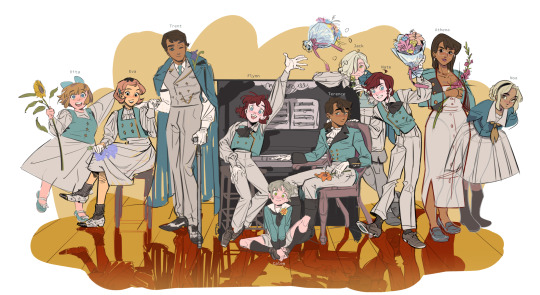
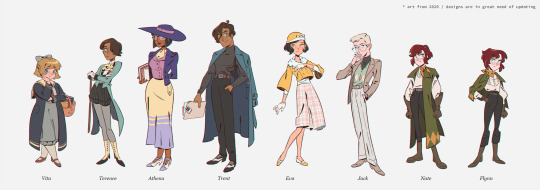


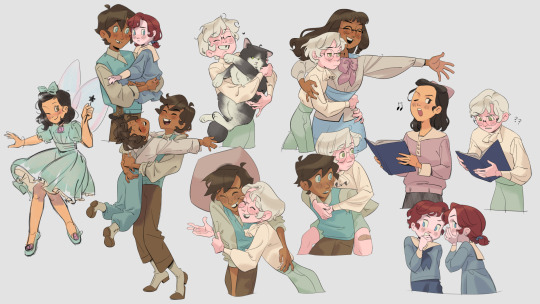




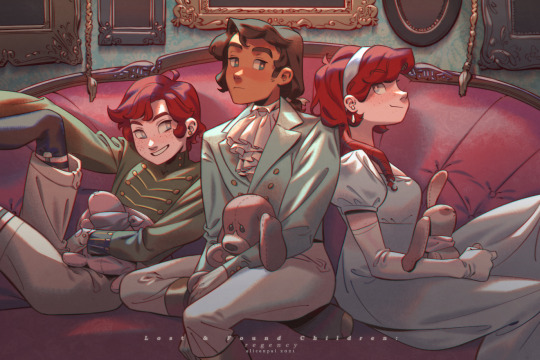

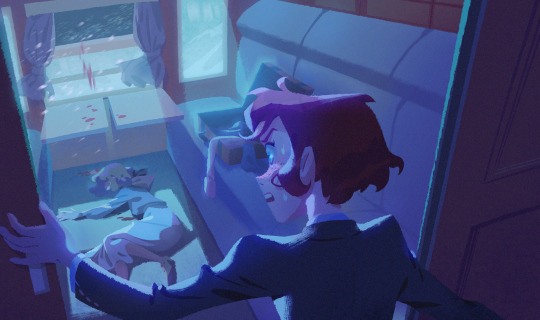
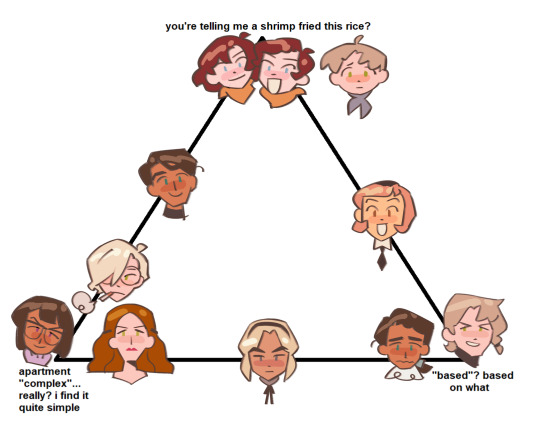
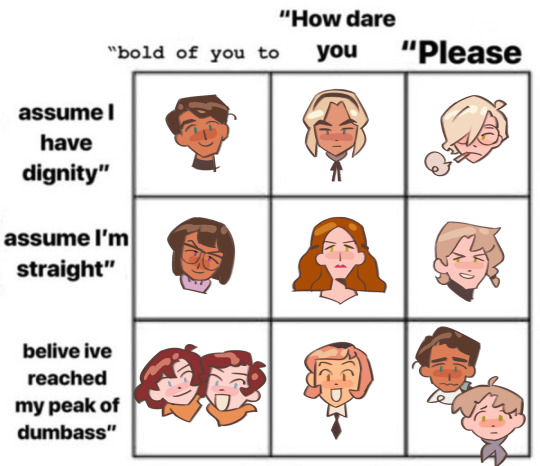
Synopsis: A search for their missing parents lead twins Flynn and Nate to fall into a deep darkness, unraveling secrets about their family and the country they once trusted.
Lost and Found Children is a story about mystery, overcoming trauma, blood family vs found family, the fear of growing up even in adulthood, the fear that you are not who you wished to grow up to be. The characters explore their identities in a post-war torn society, and witness their love being tested in that wildly changing world.
The story explores the horrors of war, and is also a study on the horrors of child abuse and when child rearing is left in the wrong hands, which can have devastating lifelong consequences. More importantly, it is a story about how love persists despite all odds.
Fun trivia:
The story has changed settings many times, from a tragic Victorian familial drama, to a modern school mystery, a 1920s crime drama, now it’s a historical fantasy.
This is a story I’ve been writing since I was 13 years old. The current iteration is from 2019, and I started revamping it as part of a school project. As it is a very old story that I literally grew up with, revamping it seriously has been a huge task, finding difficulty in deciding whether I should remove, keep, or add things like themes and characters. As of right now, a number of characters are still very much unrefined!
Flynn and Nate are not actually my oldest OCs.
Inspirations:
Growing up, I consumed a lot of Japanese media, and I mix what I learn from real world history with series that have impacted me a lot, like Fullmetal Alchemist, Pandora Hearts, Violet Evergarden. I draw influences from these periods: the industrial revolution in England & the west, late 1800s England, and early 20th century American history, especially the interwar period.
For the character designs, I'm inspired by historical fashion and JRPG aesthetics. My aim is to design them more simply and more humbly (a la Ryoko Kui style), but I still try for a whimsical old world look, bordering on fantastical. I do want a bit more steampunk look to my story moving forward, and that's an aesthetic I need to experiment with and study in my artwork a lot more often.
🌱
THE MAGICIAN’S PROTEGEE

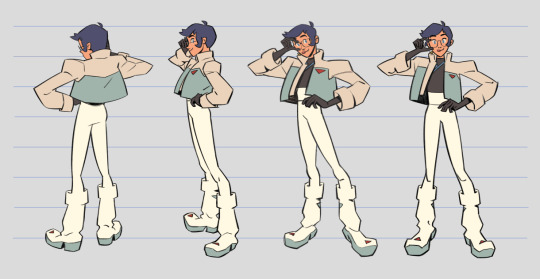
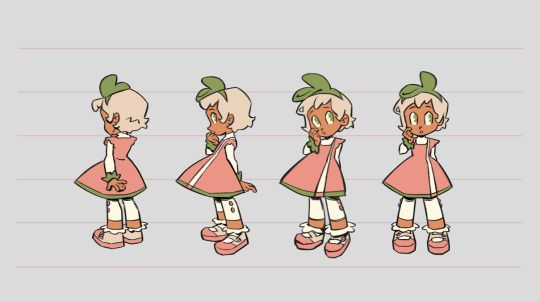
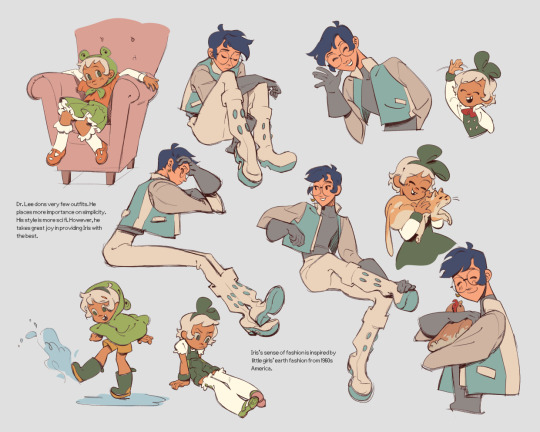

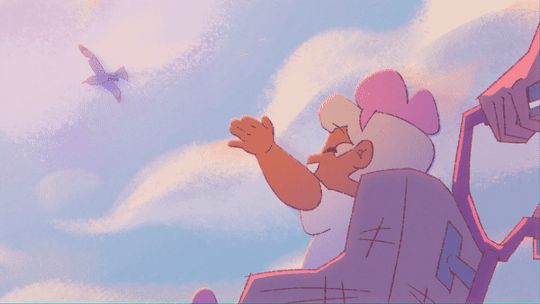
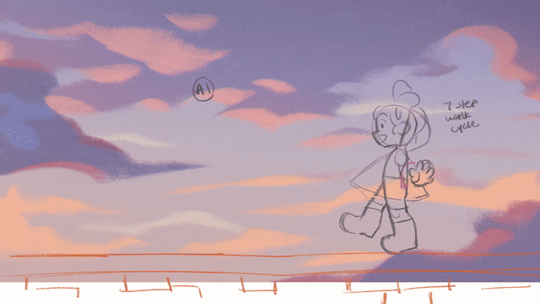
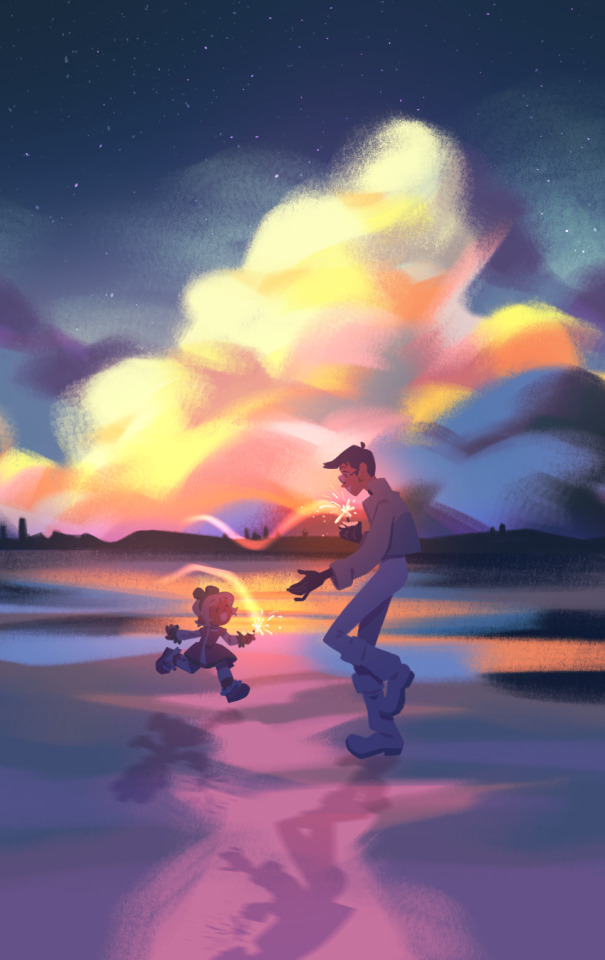

Synopsis: In a distant, idyllic future where robots and humans coexist - a healthcare android lives day to day with his adoptive daughter, patients, and their ragtag android and human friends.
The story is a light-hearted, slow-paced, slice of life series - but it will also deal with complex topics like artificial intelligence, existentialism, and the fear of outliving the people you care about the most.
THE MAGICIAN'S PROTEGEE IS UNDER HIATUS. (as of Nov 2023)
Fun trivia:
This story used to be about the Victorian occult (hence the title), also about a doctor who saves people from the ghouls that plagued Victorian society. However, without a greater purpose to the story, and only using the setting as a cool backdrop, it was a "monster of the week" series that I didn’t have any interest in writing. I scrapped the Victorian setting, in favour of writing a fantasy world I could fully have control of. It’s very different from LaFC, but it’s also a story I wish to tell from my heart. LaFC is like, the moody night story, and TMP is the sunny day story.
The current iteration is from 2020, also developed for a school project. As I was much older (than 13 haha) when creating this series, I had a pretty clear image of the story and its themes compared to writing LaFC.
Inspirations:
The inspiration for the world building comes from series like Eureka Seven, Kino's Journey, and Aria (Kozue Amano). I also draw a lot of inspiration for world building and writing from American post WWII/cold war society and culture, especially the boom in science fiction and spy fiction. I also take inspiration from early-mid 20th century Hong Kong, China, and Japan for worldbuilding and setting - their visual motifs, response to western technology and changing attitudes and culture.
#my stories#my ocs#lost and found children#the magician's protegee#ocs#original#long post#flynn#nate#terence#trent#jack#eva#noa#vita#calem#dr. lee#iris
95 notes
·
View notes
Text
Squander enough time on TikTok these days and the signs of creative deceleration are everywhere.
“Try-hard” slang is spreading. Competitive aging is a thing. Classic episodes of The Sopranos are fed to you in polished 25-second bites. Last October, the 2004 cult teen comedy Mean Girls was portioned into 23 parts to unanimous celebration. (Did I mention pirated content is on the rise?) Everyone, it seems, wants to revisit the world as it was two decades ago, of all places, on the so-called app of the future.
Relics of the New Millennium are again in vogue, and especially on TikTok, where you get the sense that everyone is chasing the fantasy of youth. Except, it’s just that—a fantasy.
“I keep getting served TikToks on [high-yield savings accounts] and 401ks,” one of my colleagues commented in Slack recently. “I believe the olds are in charge now.”
She’s right, of course. Millennials are currently outpacing Gen Z in the adoption of TikTok in the US, according to Pew Research Center data, which shows that the app's 30-49-year-old demographic is growing faster than its 18-29-year-old user base.
Such is the way on the social internet; still, the enshittification of TikTok continues.
One tell-tale sign of late-stage social media is the endless vomit of nostalgia regifted in pretty packaging. Tastes have aged, and the user experience is no longer one of giddy revelation—at one point, the only reaction the app seemed to generate among new users—but one of odd comfort.
It was inevitable, of course. Seasons change, apps pivot, and users learn to chase the adrenaline of the future through new and exotic machines of possibility.
When TikTok gained mass popularity in 2020 during the first outbreak of Covid-19, it signaled a reorientation of where we place value. Tastes were being reengineered. The app’s offerings were as robust as they were confounding: dance challenges, beauty recommendations, racial appropriation, expert sleuthing, and more fed its algorithmic churn. It wasn’t just endless but entertainingly so, earning a reputation for setting trends and establishing itself as an unofficial headquarters for Gen Z influencers—and, because the internet is a repeated comedy of errors, later platforming de-influencers.
Today, TikTok operates as the ideal precursor to AI and what the next digital revolution is ushering in—a blurring of realities, a blotting out. Ownership over “the sense organs of the public,” as Nicholas Carr phrased it, is the endpoint, the very future that companies like Meta and Apple want to build. And so TikTok persuades as the perfect tonic: a world of cyclical multimedia that lets you create, live in, or simply spectate at will. A 60-second harbinger of all that is coming, delivered on demand.
For many people, the sensations of digital life feel most alive on such an app. With art, suggests Jackson Arn, extreme sensation is a fraught strategy because of what it pulls off: As the artwork seduces, it also disgusts.
I now wonder if that was the point of socially-oriented technologies all along. They make you feel a little more alive. Again and again, they unlock dormant sensations: excitement, awe, satisfaction. Even disgust has the capacity to captivate. Because even in disgust there is a need to share, comment on, or understand the nature of spectacle, and how it functions. Only, the seduction of TikTok captivates a little too well, and as you age, carrying the experience of life on your shoulders while trying not to be crushed by it, you find yourself craving those sensations all the time.
That seems especially true for millennials, who were guaranteed a future that never arrived. They were dealt a bad hand—several bad hands—and saddled with the failures of those who came before them without a blueprint for a path forward. In February, I received a text from a family member. He'd applied for the SAVE Plan, and we exchanged mutual angst over our financial misfortunes, how so many friends are in the same bind, bonding over the recognition of unnatural loss, of another future we’ll never know.
Last week at the barbershop, I watched as a young man in his early thirties thumbed from video to video, his neck craned into his iPhone, blitzing through TikTok. He sat in the chair for about 40 minutes, and as the barber worked around him, not once did he glance away from his screen, except, to exclaim, “Look! You gotta see this one.”
So when I hear that millennials are usurping Gen Z as TikTok's leading demographic, I'm not shocked. The organs of our digital existence, like the body, are connected, flowing as they should even when complete comprehension evades reasoning. All of it is intertwined. The increasing thirst for mixed reality. Gen Z abandoning the rituals of digital life altogether for a more analog experience. The decline of TikTok as millennials eclipse the platform. The previous world is ending. So is social media as we knew it. And we again want to feel something—even if, and only for a little while, that something is 2004.
13 notes
·
View notes
Text
April 1, 2023: Reasons to Live Through the Apocalypse, Nikita Gill
Reasons to Live Through the Apocalypse
Nikita Gill
Sunrises. People you have still to meet and laugh with. Songs
about love, peace, anger, and revolution. Walks in the woods.
The smile you exchange with a stranger when you experience
beauty accidentally together. Butterflies. Seeing your grandpar-
ents again. the moon in all her forms, whether half or full. Dogs.
Birthdays and half-birthdays. That feeling of floating in love.
Watching birds eat from bird feeders. The waves of happiness
that follow the end of sadness. Brown eyes. Watching a boat cross
an empty sea. Sunsets. Dipping your feet in the river. Balconies.
Cake. The wind in your face when you roll the car window down
an open highway. Falling asleep to the sound of a steady
heartbeat. Warm cups of tea on cold days. Hugs. Night skies. Art
museums. Books filled with everything you do not yet know.
Long conversations. Long-lost friends. Poetry.
==
‘bout that time, eh, chaps?! Happy National Poetry Month once again.
As a reminder, you’ve signed up to receive a poem every day in April. Anyone can do the same right here. Or follow along on Twitter, Tumblr, or RSS. Hooray, poetry.
==
Many(!!) years of Aprils predate this one. You can browse the archives by jumping to the poem sent on today’s date in:
2022: New Year, Kate Baer
2021: Instructions on Not Giving Up, Ada Limón
2020: Motto, Bertolt Brecht
2019: Separation, W.S. Merwin
2018: Good Bones, Maggie Smith
2017: Better Days, A.F. Moritz
2016: Jenny Kiss’d Me, Leigh Hunt
2015: The Night House, Billy Collins
2014: Tim Riggins Speaks of Waterfalls, Nico Alvarado
2013: Nan Hardwicke Turns Into a Hare, Wendy Pratt
2012: A Short History of the Apple, Dorianne Laux
2011: New York Poem, Terrance Hayes
2010: On Wanting to Tell [ ] about a Girl Eating Fish Eyes, Mary Szybist
2009: A Little Tooth, Thomas Lux
2008: The Sciences Sing a Lullabye, Albert Goldbarth
2007: Elegy of Fortinbras, Zbigniew Herbert
2006: When Leather is a Whip, by Martin Espada
2005: Parents, William Meredith
(Insider secret: you can usually find my top tier favs by looking at what was sent on April 1 and April 30.)
Thanks for being here, friends.
60 notes
·
View notes
Text
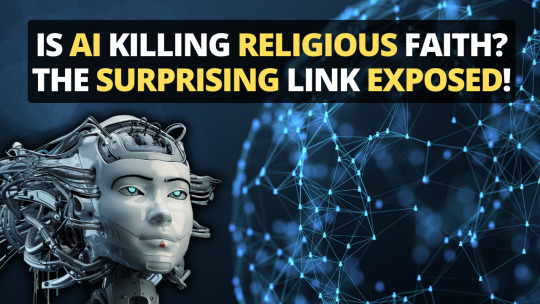
Religion has continuously declined worldwide in the 21st century, including in the United States. There are different ideas as to the factors that contribute to this decline. However, a recent paper suggests that automation in the form of artificial intelligence and robotics is a primary driver in the current downward trend of global religiosity.
In a recent paper, researchers argued that automation in the form of robotics and AI is the real driver of the recent trend. A series of experiments showed that exposure to automation at the national and local levels is linked to a reduction in religiosity.https://t.co/LklYwP0AyU
— FFRF (@FFRF) August 31, 2023
An international team of researchers recently published a paper titled “Exposure to Automation Explains Religious Declines” in the Proceedings of the National Academy of Sciences (PNAS). The report sought to explain the decline of religion amidst the technological advancements in the 21st century.
“When people can use technology to predict the weather, diagnose and treat illness, and manufacture resources, they may rely less on religious beliefs and practices,” the paper said.
Although technological advancement has been considered a primary factor in religion’s decline globally, religiosity hasn’t seen a massive drop during historical periods where technology significantly developed, notably the Industrial Revolution, the Space Race during the Cold War, and the rise of Personal Computers.
The researchers presented a hypothesis as to why religiosity only dropped massively as recently as the 21st century. It’s not technology itself that reduces religiosity, but automation, mainly in AI and robotics, two technological advancements that only became prominent in the 21st century.
“This claim is based on recent research on lay perceptions of automation. Such studies show that people ascribe automation technology with abilities that border on supernatural,” the researchers wrote.
“Historically, people have deferred to supernatural agents and religious professionals to solve instrumental problems beyond the scope of human ability. These problems may seem more solvable for people working and living in highly automated spaces,” they added.
The researchers conducted four experiments to test their hypothesis. The first tracked religious decline from 2006 to 2019 across 68 countries through a survey question with more than two million respondents, which said, “Is religion an important part of your daily life?”
They reported that exposure to robotics “was robustly and negatively associated with religiosity across the globe.” The correlation remains valid even after factors such as GDP per capita, telecom development, and energy development have been considered.
The second experiment examined the decline in religious belief in the United States, comparing religiosity rates and robotics growth in metropolitan areas from 2008 to 2016.
“Metropolitan areas with higher levels of robotics growth (+1 standard deviation) experienced an approximately 3% yearly decline in religion each decade,” the paper said.
For the third experiment, the researchers followed 46,680 individuals in a specific community from 2009 to 2020, measuring their self-reported belief in God and their job exposure to automation. They discovered that the religiosity of individuals who worked at jobs with higher exposure to AI and robotics significantly dropped over time.
“People with jobs that were one standard deviation higher than the mean on occupational exposure to AI were 45% less likely to believe in God compared to people in occupations that had a mean level of exposure to AI,” the paper said.
The last experiment was conducted at the most local level. The researchers followed 238 employees in an organization, directly measuring their exposure to AI and religious beliefs. They found that AI exposure was connected to a drop in religious belief.
While the study's results were correlative and do not necessarily imply causation, they strongly support the researchers’ hypothesis that automation leads to a drop in religiosity.
“Our studies demonstrate that automation is linked to religious decline across multiple religious traditions (e.g., Christian, Muslim, and Buddhist), world regions (e.g., North America, South Asia, and Oceania), and levels of analysis,” they noted.
==
Any sufficiently advanced technology is indistinguishable from gods.
#AI#artificial intelligence#Atheist Republic#rise of the nones#leaving religion#empty the pews#decline of religion#religion#FFRF#Freedom from Religion Foundation#religion is a mental illness
18 notes
·
View notes
Note
Hi, absolutebl.......Do you mind if I ask you some random thing? I used to love shoujo/josei manga and het romance kdrama equally....But ever since I found BL manga 3 years ago, my interest in shoujo and het romance decrese a lot, and what I search for is just the dynamic between mc (male) and male lead...I don't want to read or watch mc (female) and male lead or mc (male) and female lead...
What do you think happen to me? (Sorry for this weird ask)
Really love your blog....Thank you so much, for sharing your BL analyses, reviews and recs. I learn a lot from you. Some of my fav BL series, I found them from you.....Thanks.....
Do you mind if I ask again for BL recs? Because I know here are users that did not want to receive different asks from the same person.....
Also, have you watched dmbj or read orv? Both series based on a novels that have very strong bromance vibe.....
Do you know that sotus, manner of death and 2together are adapted into manga? Before I found your blog, BL that I read are from manga and manhwa, and I was surprised when I knew that the series above are from thai drama (I know the manga first, sorry).....
Last ask, what do you think about BL or GL that make it better than het romance? Do you feel that too?
Sorry for this very long ask, if you mind, I will not ask again......Hope you have a wonderful day.....
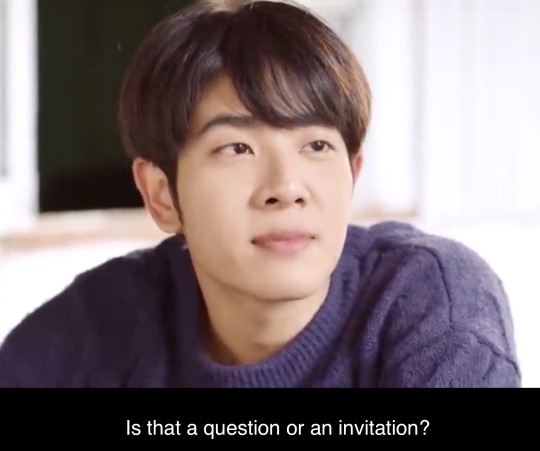
Honestly I don't know. But I can say it happened to me with manga a very long time ago. I switched from reading bodice rippers to yaoi and pretty much stopped reading anything het romance after that. (I still read scifi & fantasy that's not primarily romance, although not as much as I once did.)
Fortunately for me, the M/M self publishing revolution, and then BL, came along.
That said, I did pick up Kdramas (via Kpop), and they are now the only het I watch.
I've gone through phases where yaoi or m/m or BL was ALL I was consuming for a couple years. And then just stopped. Stared reading more widely for a while. (I'm making the comparison with books because I have never had the opportunity to do this level of obsession with cinema before, there has never before been enough on screen queer romances for me to just watch those and nothing else until 2020. Now there is.
Honestly, I don't know why this happened or me, or anyone else.
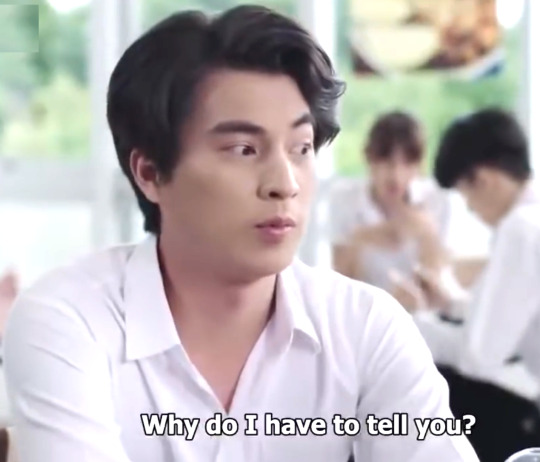
To understand why we like a thing, let alone obsesses or fixate on a thing, is so complex. Maybe it's because I come out of kink but I've learned to just go with the fetish... as it were.
It's like trying to understand why you like a particular dish, song, fashion, color, painting, architecture, even a plant or animal. I mean we can come up with explanations, flavor profiles, childhood formation of taste, family backgrounds, and so forth. Or academic analysis to do with disenfranchisement and the psychological appeal of narrative and beauty.
But sometimes often we like a thing because we like a thing.
I know, for humans, the "why" is our most powerful question. (Marketing also knows this, incidentally.) One of the reasons we tell stories AT ALL (to ourselves, to others, around a campfire in ancient times) is our search for the eternal why. It gave us mythology. It gave us religion.
But sometimes, especially with art, I feel like it's better just to dwell in wonder and grey spaces. The awe and the enjoyment itself, without understanding, it part of the experience.
Worship at the church of BL? Is that what this is? Maybe?
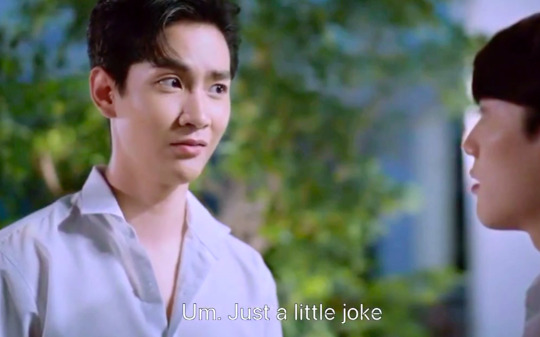
Some kinda thoughts anyway?
Generally these narratives provide a sense of comfort. Perhaps our love is something to do with characters who normally struggle (and usually are marginalized, tortured, killed and/or miserable) getting their happy evers? Perhaps it's because it's pure fantasy in terms of relationship. (I think for a lot of straight women there is something profoundly alluring in a gay relationship that they had/have no chance of every experiencing or being part of, the otherness itself is part of the appeal.) Perhaps its the lack, we never before had enough content to get obsessed over it to this level. (Let's not talk about the number of times I rewatched Latter Days after I got it on DVD, okay?)
I mean it's worth putting yourself through a thought experiment. Write down a list of ten things you like about BL that make it differnet from other kinds of media.
But you may find it's just like "why do I eat at Wendy's instead of Burger King?"
Because I like it better. They do the thing I like. (Spicy chicken sandwitch, FYI).
Perhaps it's something more profound, a kind of narrative sexual identity. It's the thing you desire. Then again, I'm pretty fluid in my desires, so I am comfortable with the idea of being attracted to different people at different points in my life. Just like being into different kinds of media at different times in my life.
I wouldn't worry about it if I were you, so long as:
It's not to addition level (damaging your emotional/financial well being)
You're comfortable with the notion that your tastes may change again
Other Questions
Do you mind if I ask again for BL recs? Because I know here are users that did not want to receive different asks from the same person.....
I am always happy to give out BL recs! The more specific the better. I consider it my primary service to humanity, at this juncture.
Also, no offense but I get so many asks from so many people I rarely remember who's asked me stuff before. Unless you have a very notable icon or style of writing, or interact with me regularly in comments & DMs. My memory is CRAPTASTIC. And I run multiple social media accounts several of which have much higher volume interactions than this one. It's not you it's the law of Dunbar's number. The human brain only really has the capacity for 150 social connections. And frankly, I don't know if I can manage even that many anymore.
Also, have you watched dmbj or read orv? Both series based on a novels that have very strong bromance vibe…..
Nope. I don't watch bromances if I can help it. Too much actual kissing these days to distract me, and I am one of those who wants some kissing for my queers.
Do you know that sotus, manner of death and 2together are adapted into manga? Before I found your blog, BL that I read are from manga and manhwa, and I was surprised when I knew that the series above are from thai drama (I know the manga first, sorry)…..
Yes and Yen Press picked up SOTUS for the USA print market. I'm hope to read that someday. I haven't tried MoD or 2g. I tend not to read reverse adaptations in general, not sure why. Also, I went off manga when it went primarily online. Never even experienced the manwha revolution. I'm old school enough to not enjoy graphic media scrolling. I miss turning pages "backwards" and getting amused my misstranslations.
Last ask, what do you think about BL or GL that make it better than het romance? Do you feel that too?
I don't like a value judgement like "better" on pop culture. I would just say "I personally enjoy it more" so I guess "better for me" would be how I might put it?
In my case? I think it's primarily that I spend so much of my life with little to no queer romance in it. And I mean modern romance all sappy and happy and cheesy and safe. It's just pure joy to have it available to me in such volume on my screen with such pretty trappings, flawed as it may be.
But also.
I just like it.
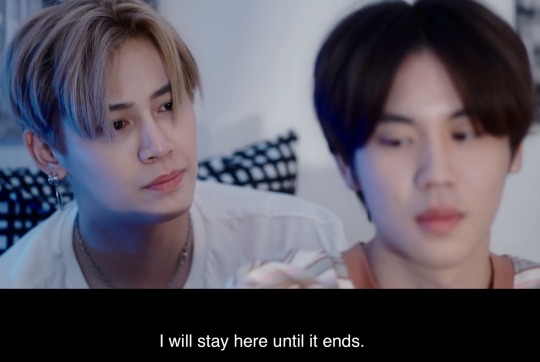
#asked and answered#i got a plane to catch#loves and cheese to the queer babies#thai bl#why do we like bl#just another random essay from p'abl
45 notes
·
View notes
Text
Stewart Rhodes, the founder and leader of the Oath Keepers, was sentenced to 18 years in prison on Thursday for leading a far-reaching plot to keep then-President Donald Trump in power after he lost the 2020 election.
A second Oath Keepers member, Kelly Meggs, the leader of the Florida contingent of the group, was sentenced to 12 years in prison.
The sentences are the first handed down in over a decade for seditious conspiracy.
“What we absolutely cannot have is a group of citizens who – because they did not like the outcome of an election, who did not believe the law was followed as it should be – foment revolution,” District Judge Amit Mehta said before handing down the sentence. “That is what you did.” ...
Mehta said Rhodes, 58, has expressed no remorse and continues to be a threat...
Earlier on Thursday, Mehta ruled that Rhodes’ actions amounted to domestic terrorism.
“He was the one giving the orders,” Mehta said. “He was the one organizing the teams that day. He was the reason they were in fact in Washington DC. Oath Keepers wouldn’t have been there but for Stewart Rhodes, I don’t think anyone contends otherwise. He was the one who gave the order to go, and they went.”
Rhodes was convicted of seditious conspiracy by a Washington, DC, jury in November in a historic criminal trial that was a test of the Justice Department’s ability to hold January 6 rioters accountable and validated prosecutors’ arguments that the breach of the Capitol was a grave threat to American democracy.
The seditious conspiracy charge has rarely been brought in the century and a half that the statute and its forerunners have been on the books...
US Capitol Police officer Harry Dunn, who testified earlier this week about his experience on January 6, told CNN that Donald Trump should be “next.”
“It is a step towards full accountability,” Dunn said. “[Stewart Rhodes's] lawyers argued that Donald Trump is the root of the problem, and I totally agree. Let’s get him next.” ...
CNN National Security Analyst Juliette Kayyem said the sentencing should have a “chilling effect on these groups,” especially as the presidential election season begins.
“This tough sentence is going to make the Oath Keepers, the Proud Boys, all these organizations, it’s going to make them more difficult for them to recruit and, as important, for them to raise money,” Kayyem said...
Rhodes, who was accused of leading dozens other individuals in a coordinated plot that culminated in the January 6 siege, was also found guilty of obstructing an official proceeding and tampering with documents.
Of those that Rhodes led, 22 have already been convicted of various federal crimes by a jury or guilty plea. Eight, including Rhodes’ codefendant Meggs, were convicted of seditious conspiracy.
-via CNN, 5/25/23
#oath keepers#proud boys#stewart rhodes#sedition#seditious conspiracy#january 6#coup attempt#trump insurrection#insurrection#united states#us politics#criminal justice#right wing extremism#good news#hope
112 notes
·
View notes
Text
The Sting

—the elephant in the room is extreme income inequality.
How big is this elephant? A staggering $50 trillion. That is how much the upward redistribution of income has cost American workers over the past several decades.
...for our four-decade-long experiment in radical inequality had grown to over $47 trillion from 1975 through 2018. At a recent pace of about $2.5 trillion a year, that number we estimate crossed the $50 trillion mark by early 2020. That’s $50 trillion that would have gone into the paychecks of working Americans had inequality held constant—$50 trillion that would have built a far larger and more prosperous economy—$50 trillion that would have enabled the vast majority of Americans to enter this pandemic far more healthy, resilient, and financially secure.
Time
This is another way of looking at the wealth transfer I wrote about to my sister yesterday. Starting roughly with the 'Reagan revolution', the top 1% have siphoned off $50 trillion dollars from the rest of the country, compared to how income was distributed beforehand.
In short, it has been the biggest, most brazen robbery in history, and in broad daylight. Theoretically this could be fixed by raising taxes on the wealthy and corporations, but with the monied interests having a stranglehold on one political party as well as the judiciary it's almost impossible to change in practice.
This is why we can't have nice things.
34 notes
·
View notes
Note
Hi!!
Do you have any recommendations for Miguel O'hara fanfics?
Heya, anon!!! 👋 this post ate itself the first time i tried to make it, but we should be smooth sailing now.
not a massive amount of new fics in the past two years, but more than i was expecting! it helps that atsv hype has been ramping up and up, lol, and i'd be lying if i said i didn't feel that excitement, too. i really hope the movie does him justice!
(recs under the cut to spare y'all's dashboards. no Extra Commentary this time, unfortunately, because i'm still miserably sick rn.)
(2021 fic rec post here ! some info—wordcounts, since-changed usernames, etc.—may be outdated.)
Crossing Broken Bridges by Greenygal (1,359 words, one-shot)
“Set several years pre-canon. Miguel shows up at Gabriel's place after The Dana Thing.”
Moonlighting by Neotoma (1,772 words, one-shot)
“Gabriel always follows his girlfriends into whatever they're into. Miguel wishes it wasn't Revolution.”
Worn Web by ItsMagp13 (680 words, one-shot)
“Miguel's exhausted, Gabriel's concerned. The two talk it out.”
Miles, Stop Making People Worry by Mothman_Ass (1,369 words, one-shot)
“i had to get this out bc it was just taking up space in my head and I couldn’t think about anything else lol ^_^”
(miles-centric, outsider pov)
Studies Show That Saying "Y'know" Doesn't Make Other People Know by Mothman_Ass (1,842 words, one-shot)
“quick thing about Miles and Miguel interacting !”
(outsider pov)
and NOW. now it is time 4 the shameless self-plugs—
(just as a heads-up, both of these fics are. like. p Heavy Angst. )
taking water to the river, and wood to the fire (11,104 words; 4 chapters, ongoing)
Mig has a Very Bad Couple Of Days, and then i do to him what Danny Phantom fans have been doing to that poor boy since 2003--
..features a lot of, well. a comment on the second chapter said it best: Deranged Biology Experiments.
thematically less abt the “shock horror” aspect of Finding Oneself Embroiled In An Insanely Messed-Up Situation and more abt. uh. a lot of metaphors, tbh. it’s an experimental fic in a lot of ways, and i'm having fun leavin' things between the lines in the meanwhile.
and, thus, the cathedral had spoken (wishing well to all us sinners) (704 words, one-shot)
haha anyways lol. this one's just a poem from 2020 where i pushed miguel out a window mid-origin story for Funsies
#talking tag#ask#spider-man 2099#spiderman 2099#miguel o'hara#fic recs#fic rec list#marvel#marvel 2099#bwug..#might've missed some idk i'll edit em in later if i need 2#gonna go lie down on the floor now. brain scrampled egg
42 notes
·
View notes
Text

a terra incognita character introduction
cast: jake ✗ fem.reader
synopsis: as the world entered the middle of the 21st century, many things have changed for the better or for worse in the newly united korea peninsula: the preparation for the succession of the new conglomerates of the past decade, the uprising of deviant androids, and the new layer of life shield by walls of codes. in the middle of it, two beings are trying to understand each other and the situation of the world they live in; an unknown territory
genre: cyberpunk, cyber noir, psychological thriller, science fiction, dystopian future, politics and philosophies regarding artificial intelligence and humanity, romance, drama, angst, mature content (war and revolution, explicit smut)
based on: video game cyberpunk 2077 (2020) and detroit: become human (2018), anime serial experiments lain (1998), and tv show succession (2018-2023)
masterlist

from north seoul
(y/n)
name: (l/n) (y/n)
aliases: Error 403: Forbidden
age: 20
species: human
gender: female
family: mom (deceased), dad (deceased), leon (uncle; alive), mara (aunt; deceased), kai (cousin; alive), bahiyyih (cousin; alive)
affiliation: the rebellion, deviant androids
backstory: Error 403: Forbidden
leon
name: (l/n) leon (oc)
aliases: the mechanic
age: 49
species: human
gender: male
family: mara (wife; deceased), kai (son; alive), bahiyyih (daughter; alive), (y/n)'s dad (brother; deceased), (y/n)'s mom (sister-in-law; deceased), (y/n) (niece; alive)
affiliation: deviant androids
backstory: a mechanic specializing in electronics and automotive, he changes his ways after the family incident of 2035 and is given the responsibility to take care of his niece, (y/n). he adopted two deviant androids, kai and bahiyyih, and now specializes in android repairs and modification
kai
name: (l/n) kai (portrayed by txt's hueningkai)
aliases: HG200 #202 448 140
species: android (HG200)
gender: male
family: leon (father; alive), mara (mother; deceased), bahiyyih (sister; alive), (y/n)'s dad (uncle; deceased), (y/n)'s mom (aunt; deceased), (y/n) (cousin; alive)
affiliation: the rebellion, deviant androids
backstory: dubbed the "dream brother", HG200 is part of the HG series known as the "siblings series". kai, a name he chose after being deviant, used to be a part of a family of abusive parents and their daughter who has autism with the android who is now bahiyyih. by defending the daughter from ongoing attacks, kai deviates from his original path then were scrap to the junkyard, being saved and adopted by leon where they searched for bahiyyih
bahiyyih
name: (l/n) bahiyyih (portrayed by kep1er's huening bahiyyih)
aliases: HG400 #462 777 207
species: android (HG400)
gender: female
family: leon (father; alive), mara (mother; deceased), kai (brother; alive), (y/n)'s dad (uncle; deceased), (y/n)'s mom (aunt; deceased), (y/n) (cousin; alive)
affiliation: the rebellion, deviant androids
backstory: dubbed the "dream sister", HG400 is part of the HG series known as the "siblings series". bahiyyih, a name she kept after how much she liked the meaning, used to be a part of a family of abusive parents and their daughter who has autism with the android who is now kai. by helping said daughter from abuse by alerting emergency services, bahiyyih deviates from her original path and escaped to live in an abandoned building before being saved and adopted by leon with kai

taglist: @raeyunshm @endzii23 @fluffyywoo @camipendragon @hiqhkey @wccycc @cha0thicpisces @y4wnjunz @yeehawnana @beansworldsstuff @kimipxl @blurryriki @reallysmolrenjun @frukkoneeeeg
© writingmochi on tumblr, 2021-2024. all rights reserved
#enhypen imagines#enhypen smut#enhypen x reader#enhypen scenarios#enhypen angst#enhypen fanfiction#jake x reader#rsc: t.i.#cr: jake#cs: enhypen#sc: regina
40 notes
·
View notes
Text
the irony is before covid and the climate crisis kicked into full gear I was the neighborhood skeptic, my first incarnation of this blog (Clever Beast) was all that, a mania of skeptical pursuits but closely aligned with a healthy criticism of scientism. oh 2008. then the world went batshit, and for many people today anything scientific that doesn't perfectly align with taste got siloed out of existence. now you can mix and match realities to suit your lifestyle. it's enough to make a postmodern postdoc blush.
I still want science to be scrutinized, there's a whole lot wrong, particularly with the institutions funding it and where it doesn't go. As with anything, there are trailblazers that defy the groupthink and make revolutions, and also just solid day-to-day science being done by smart, professional, talented people. I didn't say that enough before, but jesus, in 2023, lets bang some pots and pans for these servants of stoicism.
since 2020 I have spent more and more time reading scientific papers, following scientists, absorbing minutiae of shit I didn't even know existed. I'm no scientist, and my reading is more as an information specialist, and having a lot of time to see how pieces of data interact with other pieces of data, how consensus shifts and evolves. I operate from the primary opinion that people smarter than me know what they are talking about and their consensus on issues pertaining to my health insofar as their opinions are not outright bought by corporations, have greater weight to me than say, Dr Mike's Youtube's channel. That science has a talent for weeding out the shit, although too rigorously it can lose some of the nuances, so it's sometimes necessary to integrate the scientific consensus within a larger framekwork of understanding that can take into consideration human faculties beyond reason to assess value.
The science says we're fucked. climate scientists are losing their shit, and being very unscientific with their hyperbole, and even the fucking Pope is out there dooming away, and the Pope is always twenty years behind the zeitgeist, so you got a good idea of where we are now. and Covid. We don't even know the 5 year prognosis of the disease, and people are pretending it is over. not epidemologists, immunologists, the ones that have been consistently right, over and over, as the minimizers have been trying to downplay the crisis these last three years. Their expert opinions are dire as well. It's affecting fertility, brain chemistry, diabetes, immune systems, we don't have individual all-star variants anymore, we have soups of variants, so that repeat infections are easier to get closer together. and repeat infections are increased chance of long covid, and while minimizers love pointing at deaths as some marker of progress (though awfully silent pre-vaccines) I would rather be dead then experience what some of the long haulers of covid go through, and I read about on a daily basis. At-risk. we are ALL AT-RISK. Co-morbidities... fucking professional athletes are dropping dead, and you want to fat shame us.
Everyone has a threshold for bad news. Seems like a lot of people it is magical thinking to erase it all from their minds, a pandemic ptsd, anxiety, just low tolerance for reality. Ok. Problem is we need to dig ourselves out of this, and the people that can see this clearly, are clamoring for your attention. Denial of reality will kill us all, will kill us faster. I don't know what the best approach is, I don't know how to turn this ship around, but we need to start acknowledging some basics of reality, and be civic-minded, and give a shit about each other. It was dumb but I liked the banging of pots and pans for nurses. it was the last time I felt like I was part of a society. I don't want to pretend anymore. it makes it all more depressing to me. Even a loud minority can make significant changes, it's a weird glitch in the democratic system. We just need to process reality more, being cognizant of facts, speak up when people lie, speak up when people tell the truth, disseminate information the way the media is supposed to do, vote, donate, give a shit. It's good to feel.
this is an unedited rant but you get the idea. wake up, please, wake up. we need you.
18 notes
·
View notes
Text
A Brief History of music in Stalinist Russia
From 1946 to his death in 1953, Stalin banned jazz and many other forms of western music in the former Soviet Union. However many found ways around this and sold copies of records on the black market that were etched into the surface of old X-rays. Recordings of artists like Elvis Presley were etched over pictures of rib cages, skulls, or thigh bones. Used X-rays were a convenient replacement for an actual for vinyl records, and due to World War II, hospitals were overflowing with them. So there was no shortage of supply or demand.
The Nazi invasion of the Soviet Union in June 1941 stunned the unready Soviet forces. Stalin's administration was forced to react quickly and devote all its resources into the war effort. As a result, Soviet music witnessed a relaxation of restrictions on expression. This period was a break from the policies of the 1930s. The Communist Party, seeing as it was allied with several Western powers, focused on patriotic propaganda rather than anti-Western rhetoric. With a restored connection to the west, Soviet music experienced a new wave of progressivism and experimentation.
Following the end of World War II, the communist party were persuaded to put an end to the patriotic propaganda and were encouraged to reinforce themes of the Russian revolution. In response to this, composers were desperate to find acceptable compositions. Some composers such as Prokofiev and Shostakovich turned to film music. Shostakovich did not publish his more expressive works until after Stalin's death.


Dmitri Shostakovich
Shostakovich was born just before the Russian revolution and grew up in the USSR. Many of Shostakovich’s pieces had to be re-composed or scrapped entirely as they did not fit with the slim criteria that the state wanted music to fit in the USSR. He had to wait until after Stalins death to compose the music he wanted. Many other Russian composers experienced this as well.
Shostakovich was known to display symptoms of anxiety, internalised stress and was said to have been a sensitive individual causing somatic symptoms. His negative relationship with the Soviet Union added to issues he faced in his life and with his mood. He spoke constantly about pain, describing his life under Stalin’s regime as “unbelievably mean and hard. Every day brought more bad news and I felt so much pain. I was so lonely and afraid.”
In 1936 he was denounced as an “enemy of the people” by the Soviet regime after Stalin attended and disliked the composer’s opera Lady Macbeth of the Mtsenk District. Dmitri was “as white as a sheet” when he saw Stalin in the audience, an experience which increased his fears and paranoid thinking. He was known to have kept a small suitcase packed in case of arrest and slept in the stairwell out of fear. He reflected on this anxiety: “When a man is in despair, it means that he still believes in something.”
Sources:
https://hekint.org/2020/09/22/shostakovich-shrapnel-and-chronic-poliomyelitis/
#shostakovich#dmitri shostakovich#music#music history#history#historynerd#music nerd#russian music#classical music
3 notes
·
View notes